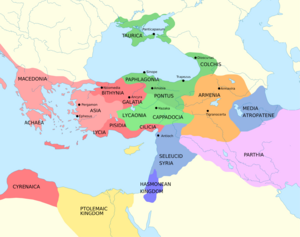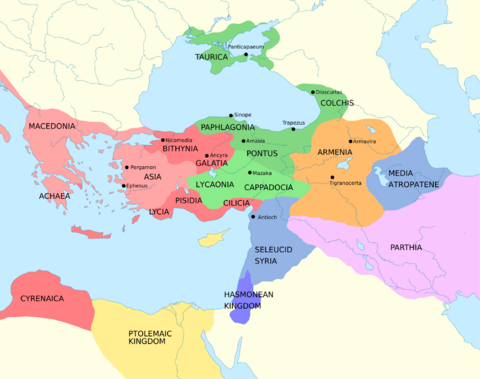First Mithridatic War facts for kids
Quick facts for kids First Mithridatic War |
|||||||||
|---|---|---|---|---|---|---|---|---|---|
| Part of the Mithridatic Wars | |||||||||
 The Near East in 89 BC |
|||||||||
|
|||||||||
| Belligerents | |||||||||
|
|
||||||||
| Strength | |||||||||
|
|
||||||||
| Casualties and losses | |||||||||
|
|
||||||||
The First Mithridatic War (89–85 BC) was a big conflict where the Roman Republic fought against the Kingdom of Pontus. This war happened because Pontus, led by its powerful king Mithridates VI, wanted to expand its control over the Greek world. Many Greek cities also joined Mithridates, rebelling against Roman rule. The war lasted five years and ended with Rome winning. Mithridates had to give up all the lands he had taken and go back to Pontus. But this wasn't the end; the fight with Mithridates VI started again in two more Mithridatic Wars.
Contents
How the War Started
After becoming king of Kingdom of Pontus, Mithridates VI of Pontus wanted to make his kingdom bigger. However, many of his neighbors were states that were friendly with Rome. Expanding his kingdom meant he would eventually clash with Rome.
Mithridates first took control of most of the coast around the Black Sea. Then, he looked towards Asia Minor, especially the Kingdom of Cappadocia. His sister, Laodice, was the queen there. Mithridates arranged for her husband, Ariarathes VI, to be killed. This left Laodice in charge as a regent for her young son, Ariarathes VII of Cappadocia.
Laodice then married Nicomedes III of Bithynia, a country that was often an enemy of Pontus. Nicomedes took over Cappadocia, but Mithridates quickly drove him out. Mithridates then put his nephew on the throne. When his nephew didn't agree with him, Mithridates invaded Cappadocia again and killed him. He then placed his own son, also named Ariarathes, on the throne.
Nicomedes complained to the Roman Senate. Rome decided that Mithridates should leave Cappadocia. They also appointed Ariobarzanes I of Cappadocia as the new king of Cappadocia. Mithridates then convinced his son-in-law, Tigranes the Great of Armenia, to invade Cappadocia and remove Ariobarzanes.
The Senate sent Lucius Cornelius Sulla, a Roman commander, to deal with the situation. Sulla successfully drove out Mithridates' allies and the Armenians, putting Ariobarzanes back on his throne.
Later, Nicomedes III of Bithynia died, and his son Nicomedes IV became king. But Nicomedes IV's half-brother, Socrates Chrestus, supported by Mithridates, drove him from his kingdom. Nicomedes IV fled to Rome, and the Romans promised to help him get his throne back. At the same time, Tigranes, Mithridates' ally, invaded Cappadocia again and removed Ariobarzanes.
The Roman Mission to Asia
In 90 BC, a Roman group led by Manius Aquillius was sent to Asia. Their job was to help Nicomedes and Ariobarzanes get their kingdoms back. The Roman governor of Asia, Cassius, had a small army, and Mithridates was also asked to help.
Cassius's army was small, about 5,000 soldiers. With help from local troops, they managed to put both kings back on their thrones without a fight. Mithridates was angry but didn't stop them.
After their mission was done, the Roman group should have gone home. Instead, they stayed and started to provoke Mithridates. This was a risky move because Rome was still fighting a difficult war in Italy.
The kings, especially Nicomedes, had borrowed a lot of money from Romans to get support for their return to power. Aquillius's group included people who wanted these loans repaid. With Aquillius's encouragement, they pushed the kings to invade Pontus to get money to pay back their debts. The kings were scared of Mithridates and knew Rome hadn't ordered this, so they hesitated. But Nicomedes' lenders kept pushing until he finally agreed.
Around spring 89 BC, Nicomedes invaded Mithridates' lands, taking a lot of plunder. Mithridates had been getting ready for a fight with Rome for a long time. He didn't stop Nicomedes' raid. He wanted to appear as if Rome and its allies were unfairly attacking him. The Bithynians returned home with much wealth.
After the raid, Mithridates sent his spokesman, Pelopidas, to complain to the Roman leaders. Pelopidas said that Rome was being unfair to Mithridates and asked them to stop Nicomedes. Bithynian representatives replied, saying that Mithridates was building up a huge army and making alliances, which showed he was planning to attack Rome, not just Bithynia. Pelopidas then said Mithridates would accept all of Rome's past decisions but insisted that Rome should stop Bithynia's recent attacks or let Mithridates take revenge.
Pelopidas's arguments made the Roman representatives look bad. They had to admit that an injustice had been done. After a long delay, they announced that Rome didn't want to harm Mithridates, but they also couldn't allow war against Nicomedes because it would weaken Rome's interests. This answer was not enough for Mithridates.
Mithridates Takes Back Cappadocia
Mithridates knew that complaining to the Roman Senate wouldn't help him much. He wanted to act while the invasion of his land was still fresh in everyone's minds. After Pelopidas returned, Mithridates sent his son Ariarathes with a strong army into Cappadocia. They quickly took over the region in the summer of 89 BC. This was the fourth time Ariobarzanes I, who was friendly to Rome, was kicked out. This action went against Rome's orders and the peace treaty. It was a clear sign that Mithridates was ready for a serious war with Rome.
Both sides then started gathering large armies for a full-scale war. News of Mithridates taking Cappadocia again reached Rome. The Romans decided that Mithridates should be attacked and removed from power. The end of the war in Italy meant that Rome now had enough soldiers to send to Asia. Lucius Cornelius Sulla, a successful Roman commander, was chosen to lead the war against Mithridates.
The Massacre in Asia
The Asiatic Vespers, 88 BC
In Bithynia, Mithridates received extreme advice from a Greek philosopher named Metrodoros, who hated Romans. Metrodoros suggested that to make the people of the Roman province of Asia fully support Pontus, Mithridates should order the killing of all Romans there, no matter their age or gender. He also said that all Greek city leaders should be forced to take part. This would make it impossible for them to go back to Roman rule.
Soon after taking control of the province in spring 88 BC, Mithridates put his plan into action. The massacre was carefully planned to surprise the victims. Mithridates sent letters to all city leaders, telling them to carry out the killings exactly one month after the date of his letter. The exact date is not known, but it was around early May 88 BC.
What happened on that day had a huge impact on relations between Romans and Greeks. It is said that 80,000 Romans and Italians were killed in these "Asiatic Vespers" (meaning "evening killings").
Mithridates Against Rome
After this, Mithridates finished taking over Asia Minor and moved into Greece. He sent his general, Archelaus, to Greece. Archelaus helped Aristion become the ruler of Athens.
Rome quickly declared war. In 87 BC, the Roman general Lucius Cornelius Sulla landed in Epirus (western Greece) and marched towards Athens. Sulla's army marched through Boeotia into Attica. Most cities in the area, like Thebes, quickly joined Sulla. Most of the Peloponnese also followed after a Roman victory. However, Athens remained loyal to Mithridates, even during a harsh siege in the winter of 87/86 BC. Sulla captured Athens on March 1, 86 BC. Archelaus escaped from Piraeus (Athens' port) and landed in Boeotia, where Sulla defeated him at the Battle of Chaeronea.
Sulla's Siege of Athens
Sulla's army took Athens on February 12, 86 BC. The siege of Athens was long and brutal. Sulla's tough, experienced soldiers, who had fought in the Social War, attacked and stormed Athens.
Soon after, Sulla captured Athens' harbor of Piraeus. He looted and destroyed the area, much of which was burned down, including the famous arsenal built by the architect Philon.
Caius Scribonius Curio Burbulieus was put in charge of the siege of the Acropolis of Athens. It took some time before Aristion and his followers surrendered because they ran out of water. Athens was severely punished. This harsh treatment made sure that Greece would remain peaceful during later Roman civil wars and other wars with Mithridates.
The Chaeronea Campaign
Even after Sulla took Piraeus, Archelaus used his control of the sea to block supplies from reaching Athens or the Roman army. By early spring, Archelaus's strategy was causing problems for Sulla. The rocky land of Attica was good for fighting against the large Pontic cavalry, but it was not fertile. It couldn't feed Athens' population, let alone a large Roman army, especially with no supplies coming by sea.
In early spring 86 BC, a large Pontic army under Taxiles marched south from Macedonia into Thessaly. Archelaus refused to join him at first, preferring to continue his blockade of Attica. Thessaly was only held by a small Roman force, which had to retreat south.
Around April 86 BC, Sulla's army started running low on supplies. He decided to leave Attica and march into the fertile plains of Boeotia to feed his army. This move also exposed his army to the large Pontic cavalry. This left Archelaus with no choice but to sail north and join Taxiles.
In Boeotia, Sulla met and defeated Archelaus in the Battle of Chaeronea (86 BC). Archelaus gathered his remaining forces on the island of Euboea. Mithridates sent him 80,000 more men from Asia Minor. Archelaus then returned to mainland Greece, where Sulla defeated him again, this time at the Battle of Orchomenus. After these victories, Greece was fully back under Roman control.
The Flaccus Mission and End of the War
Meanwhile, Rome had sent another army under Lucius Valerius Flaccus. His mission was to deal with Sulla (who was seen as a rival) and then fight Mithridates. Flaccus's army went through Macedonia, crossed the Hellespont, and landed in Asia. Many Greek cities there were rebelling against Mithridates. This rebellion was partly because Mithridates had treated the people of Chios harshly, ordering them into slavery.
After crossing the Hellespont, Flaccus was killed in a mutiny led by Flavius Fimbria. Fimbria then went on to defeat Mithridates and recapture Pergamum. However, Fimbria didn't have a navy. Sulla's admiral, Lucullus, refused to work with Fimbria to stop Mithridates from escaping by sea.
Mithridates later met with Sulla at Dardanus in 85 BC. They agreed to a peace treaty. Mithridates had to give back all the lands he had taken in Asia, Cappadocia, and Bithynia to their original rulers. But he was allowed to keep his own kingdom. In return, he had to pay a huge amount of money to Rome and lend Sulla 70 ships to help Sulla return to Rome to face his political enemies.
After this, Fimbria realized he couldn't face Sulla and took his own life. This left Sulla to settle matters in Asia. He made the Greek cities there pay a huge fine and five years of back taxes. This left the Asian cities deeply in debt for a long time.
 | Shirley Ann Jackson |
 | Garett Morgan |
 | J. Ernest Wilkins Jr. |
 | Elijah McCoy |


